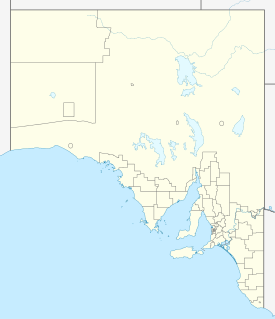| Wiljani Conservation Park South Australia | |
|---|---|
IUCN category III (natural monument or feature) | |
| Nearest town or city | Mount Pleasant |
| Coordinates | 34°45′05″S139°01′27″E / 34.75148296°S 139.02421576°E Coordinates: 34°45′05″S139°01′27″E / 34.75148296°S 139.02421576°E |
| Established | 25 February 2016 [1] |
| Area | 1.8 km2 (0.7 sq mi) [2] |
| Managing authorities | Department of Environment, Water and Natural Resources |
| Footnotes | Coordinates [3] |
| See also | Protected areas of South Australia |
Wiljani Conservation Park is a protected area in the Australian state of South Australia in the gazetted locality of Mount Pleasant located about 3.5 kilometres (2.2 mi) north-west of the town centre in Mount Pleasant. [3]

Protected areas or conservation areas are locations which receive protection because of their recognized natural, ecological or cultural values. There are several kinds of protected areas, which vary by level of protection depending on the enabling laws of each country or the regulations of the international organizations involved.

South Australia is a state in the southern central part of Australia. It covers some of the most arid parts of the country. With a total land area of 983,482 square kilometres (379,725 sq mi), it is the fourth-largest of Australia's states and territories by area, and fifth largest by population. It has a total of 1.7 million people, and its population is the second most highly centralised in Australia, after Western Australia, with more than 77 percent of South Australians living in the capital, Adelaide, or its environs. Other population centres in the state are relatively small; Mount Gambier, the second largest centre, has a population of 28,684.

Mount Pleasant is a town situated in the Barossa Council, just north of the Adelaide Hills region of South Australia, 55 kilometres east-north-east of the state capital, Adelaide. It is located in the Barossa Council and Mid Murray Council local government areas, and is at an altitude of 440 metres above sea level. Rainfall in the area averages 687 mm per annum.
Contents
It was proclaimed under the National Parks and Wildlife Act 1972 on 25 February 2016 in respect to a parcel of land in the cadastral unit of the Hundred of Para Wirra. [1] The proclaimed land is not subject to access rights under the Mining Act 1971 or the Petroleum and Geothermal Energy Act 2000. [2] As of December 2016, it covered an area of 1.8 square kilometres (0.69 sq mi). [2]

The lands administrative divisions of South Australia are the cadastral units of counties and hundreds in South Australia. They are located only in the south-eastern part of the state, and do not cover the whole state. 49 counties have been proclaimed across the southern and southeastern areas of the state historically considered to be arable and thus in need of a cadastre. Within that area, a total of 540 hundreds have been proclaimed, although five were annulled in 1870, and, in some cases, the names reused elsewhere.

The Hundred of Para Wirra is a cadastral hundred of the County of Adelaide, South Australia, spanning a portion of the Adelaide Hills north of the Torrens Valley including Mount Crawford.
Wiljani is a clan name, i.e. a family group, belonging to the Peramangk aboriginal people who traditionally lived on the land within the vicinity of what is now the conservation park. The name was selected during 2015 after a process of “consultation and approval” involving the Peramangk people and the Department of Environment, Water and Natural Resources [3]

The Peramangk are an indigenous Australian people whose traditional lands are primarily located in the Adelaide Hills, and also in the southern stretches of the Fleurieu Peninsula in the Australian state of South Australia. They were also referred to as the Mount Barker tribe, as their numbers were noted to be greater around the Mount Barker summit, but Peramangk country extends from the Barossa Valley in the north, south to Myponga, east to Mannum and west to the Mount Lofty Ranges.
The conservation park is classified as an IUCN Category VI protected area. [4]

The International Union for Conservation of Nature is an international organization working in the field of nature conservation and sustainable use of natural resources. It is involved in data gathering and analysis, research, field projects, advocacy, and education. IUCN's mission is to "influence, encourage and assist societies throughout the world to conserve nature and to ensure that any use of natural resources is equitable and ecologically sustainable".





